- Home
- Stella Hart
Cruel Riches: A Dark Captive Romance (Cruel Kingdom Book 1)
Cruel Riches: A Dark Captive Romance (Cruel Kingdom Book 1) Read online
Cruel Riches
Cruel Kingdom Book 1
Stella Hart
Copyright © 2021 by Stella Hart
All rights reserved.
No part of this book may be reproduced in any form or by any electronic or mechanical means, including information storage and retrieval systems, without written permission from the author, except for the use of brief quotations in a book review.
Contents
Prologue
1. Alexis
2. Nate
3. Alexis
4. Alexis
5. Alexis
6. Alexis
7. Alexis
8. Alexis
9. Alexis
10. Nate
11. Alexis
12. Alexis
13. Alexis
14. Alexis
15. Alexis
16. Nate
17. Alexis
18. Nate
19. Alexis
20. Nate
21. Alexis
22. Alexis
23. Alexis
24. Alexis
25. Nate
26. Nate
27. Alexis
More Information
More by Stella Hart
Prologue
Alexis
October 18th, 2019
* * *
“Come find me, Lexie.”
My neighbor Claire’s voice drifted through the freezing air, calling to me from somewhere on the far end of the Blackthorne campus quad. I squinted to see where she was, but the air was thick with soupy white fog. I could barely see beyond the tip of my own nose.
“Lexie! Help me! He’s here!” Claire’s voice sounded closer now, and her terror was evident.
I started calling out to her, running toward her voice, but when I got to the other side of the quad, the sound was coming from somewhere else. My gait turned sluggish, feet barely able to drag themselves in front of each other. When I looked up again, I realized nothing about this place was real.
I was in a dream.
The world was blurry on the edges, and I couldn’t tell up from down. Earlier, I thought I was on the ground, but the gray sky seemed to be at my feet now.
“Wake up,” I told myself, trying to pinch my arm. “It’s not happening.”
The scene shifted, and I found myself inside Claire’s dorm, staring down at a trail of dirty snowflakes on the floorboards. I had to find her, because I knew something awful had happened to her, but I didn’t know what it was, and I didn’t know how I knew.
I turned to see her broken door hanging open, halfway off its hinges. When I headed outside to the residence hall stairs, I stepped in something cold and wet. Every step was covered in slicks of ice and blood.
I started running, panic spreading through me like blasts of freezing air. I was back in the quad now, and someone was ahead of me, a black shadow in the pale mist.
“Claire!”
I shouted her name over and over, but she didn’t seem to hear me.
I finally caught up to her and grabbed her arm. “Are you okay? Where have you been?” I asked.
She didn’t reply. I frantically waved my hand in her face to get her attention, but she still wouldn’t answer or look at me. She was looking behind me.
I shook her arm. “Claire! What’s wrong?”
“It wasn’t him. It was never him,” she whispered, yanking herself out of my grip. “It’s you.”
I stared at her, aghast. “No, it’s not me. I swear.”
She nodded, eyes bulging with terror. “It’s you, but it isn’t.”
“What are you talking about?” I asked, fear and confusion roiling in my stomach. But even as I spoke the words, I knew what she meant. I wasn’t myself. I was taller, stronger, and my hands weren’t my own. They were bigger, with different skin and different nails, but they were somehow still attached to my body.
Claire turned to run away, and I pulled her back. There was a knife in my hand now. A big one. I smiled as the gleaming steel met flesh, sinking deep enough to elicit an agonized howl.
“Why?” Claire managed to croak through lips coated in bubbles of blood.
Her lavender sweater was stained with red and torn in several places now. How many times had I stabbed her already? I couldn’t remember.
I twisted the knife inside her this time, jerking it all the way in until it met hard bone. Her last cry was an anguished shriek mixed with a guttural choking sound.
Crimson cascades splashed up all over me, and as the metallic tang tingled in my mouth and nostrils, I turned around to look at the trees.
There they were. All the other bodies. They hung from the thick branches, dripping blood all over the blanket of snow beneath them.
“Who did this?” I screamed, whirling back around. “It wasn’t me, I swear! It wasn’t me!”
My eyes snapped open.
It took a minute to pull myself from that horrible place where memories and reality were twisted into nightmares. My face was coated with sweat, and my body was trembling. I felt a strange yet familiar sensation in my stomach: a toxic combination of guilt, remorse, and dread.
I sat up, still woozy with exhaustion, and I wondered why my mattress felt so hard and uncomfortable. That was when I realized I wasn’t in my dorm.
I was in a tiny room with a floor made of dirt and stone. It was quite dark, but I could tell that the walls were brick on three sides with a set of bars covering the other side. They were old and rusted. It was like a jail cell from the nineteenth century.
Slowly and painfully, I dragged myself over to the bars, wondering how I got here and why my limbs felt so heavy. It was a major effort to lift my fingers, let alone my legs. My head was filled with noise as well, like static from a radio tuned to the wrong station.
“What… what’s happening?” I muttered. When I heard my voice, I realized I was slurring. I was either trapped in another nightmare or drugged to the gills.
I rubbed my eyes and peered between the bars. There was a trace of ambient light coming from somewhere outside the cell, and when I squinted hard, I could see that I was in a tunnel.
I couldn’t remember how I got here. I couldn’t remember anything from the last few hours or days.
I turned my head to scan the little cell again. There was a flimsy mattress on one side of the space, barely big enough to fit a child, and a plastic bucket on the other side. Nothing else.
There was a faint saltiness lingering in the air. That made me sit up straighter, wondering if it was a clue that might help me figure out where I was, but then I remembered that I was on Avalon Island. It was a huge island compared to most on the planet—over five thousand square miles—but it was still small enough that the sea breeze and salty air permeated most spaces.
Frowning, I turned my nose up and sniffed the air again. There was another smell on top of the salty air. Something like sulfur, and maybe something rotting too. Death and decay.
There was another light now, and it was coming closer, bobbing up and down. A person was approaching from the right side of the tunnel. I wanted to call out for help, but something told me I should stay quiet.
As the light drew nearer, the cell became easier to see, and when I looked at the grayish brick walls and the stony floor on my left, every inch of my body began to tremble violently. I couldn’t control it, couldn’t keep myself still.
Blood.
Half the cell was coated in it; dried reddish-brown stains and smears.
Terror spread right to my bones, and then my gut, and I thought I might throw up. I leaned forward and retched int
o the bucket.
“That’s the drugs,” a deep male voice said from somewhere behind me. “They can cause nausea.”
I wiped my lips and turned around, mouth falling open at the sight of the man on the other side of the bars. He was tall and dressed in dark clothing, and a black plague mask covered his face. A small black bag hung from one arm.
“What’s happening to me?” I asked, voice cracking halfway through the sentence. “Who are you?”
He dropped the bag and crouched next to it. “I brought you some water,” he said, ignoring my questions. His voice was perfectly calm, as if everything that was happening was completely normal. “I came earlier, but you were still passed out. You know you talk in your sleep?”
I gulped and shook my head. “No.”
The terrifying plague mask tipped to the side as the man tilted his head. “You were crying. Then you were begging for forgiveness from someone named Claire.”
“She’s gone,” I whispered, slumping against the wall.
“I know. Everyone knows,” he replied, voice dripping with disdain. “It’s why you’re here.”
My eyes widened. “What?”
“It’s your fault, Alexis. You know that.”
“No.” I shook my head wildly. “No, I didn’t do anything.”
The man got off the ground and rose to his full height. Then he spoke to me for a long time.
He showed me things, too, and by the time he was done, the earlier nightmare images of blood, knives, and gutted hanging corpses were flashing all over the place in my mind, bringing up bile in my throat.
In the bleak, petrifying moments since I woke up in this place, I’d wondered how I ended up here and what was going to happen to me. Now every heartbeat pulsed a different question.
What did I do?
1
Alexis
5 weeks earlier
* * *
“What if it all goes wrong?”
My sister Sascha’s forehead was lined with concern, and her eyes were wide.
I patted her shoulder. “It’ll be fine,” I said, even though my stomach was twisting nervously.
Today, we were meeting with our estranged grandparents. Estranged probably wasn’t the right word for it, though. Complete strangers was a more apt term.
They were my mother’s parents, and they hadn’t seen her since she was fifteen years old, which meant we’d never met them. They knew we existed, because my mother had sent them brief letters about us when we were born, but that was it. We’d never heard from them, and they’d never tried to see us.
The two of them came from ‘respectable’ families on Avalon Island—which meant old money—and they’d tried to raise their three children in the same manner they were accustomed to. For my mom, that meant they were overbearing, far too strict, and massively controlling.
Her siblings seemed to receive much better treatment than her, and her parents constantly gaslighted her into believing it was her own fault. She was a problem child, they said, and that meant she deserved all the ridiculously over-the-top rules, curfews, and bans from having friends outside of their ‘appropriate’ social circles.
When she was fifteen, she couldn’t take it anymore, and she ran away in the middle of the night. Her parents barely even looked for her. They asked around for a few days, and then they cut off her access to any of their credit cards and told everyone they knew that she was simply having a ‘wild phase’.
That so-called wild phase lasted forever.
Mom floated between friends’ houses for a few months, essentially homeless, and she switched herself to a public school, seeing as her parents refused to pay for her elite prep school anymore. When she was sixteen, she moved in with a close friend she made at that school—Peter Covington. He and his family loved her like she was their own, and she thrived under their roof. She received good grades in her senior year and was accepted into a small art school in Avalon City, and Peter got into a journalism program at Blackthorne University.
By then, the two of them were no longer friends. They’d fallen in love. They finished their education, got married, and moved to Thunder Bay, where they had Sascha and me.
Thunder Bay was a nice little town on the southeast of the island, solidly middle-class and well away from Mom’s stiff parents, and we had an idyllic childhood there.
Until we didn’t.
When I was nine and Sascha was twelve, we were forced to flee the island with our mother. Our father had been accused of the most heinous crime ever committed on the island, and that made all of us persona non grata.
People didn’t care that my sister and I were just kids. They didn’t care if we thought he was innocent. To them, we were just the relatives of the Blackthorne Butcher, and that meant we were guilty by association. As if the desire to murder was contagious, and we might snap at any moment and follow in our father’s footsteps.
It was so bad that we had to change our names to avoid the constant media hounding and death threats from random people, even after we moved to the mainland. My name used to be Alexandra Covington, but from the age of nine onwards it was Alexis Livingston.
Sascha—who used to be Sarah—and I spent the rest of our childhoods in northern California, hundreds of miles away from Avalon Island and its hateful citizens.
Now we were back.
Mom thought we were crazy for wanting to return, but we had our reasons. Besides, it had been ten years since all the shit with our dad went down. No one would recognize us. Especially with our dyed hair and different names.
Sascha kept fretting. “I bet they’ll hate us.”
“Stop,” I said, holding up a palm. “They wouldn’t have agreed to meet us today unless they wanted to get to know us, right?”
“I guess so. But what if they think we’re too much like Dad?”
My lips tightened. “Would that really be the worst thing?”
“Sorry,” she muttered. “I didn’t mean it like that. I just meant—”
I sighed and cut her off. “It’s fine. I get it. But don’t worry. I’m sure everything will be fine.”
“I hope so,” she said gloomily.
I raised a brow. “This was your idea, remember? We can cancel if you don’t want to do it.”
After hearing my mother’s stories about her parents over the years, I honestly couldn’t care less about having any contact with them. Sascha saw things differently, though. She hated having such a tiny family with no grandparents, aunts, uncles, or cousins.
My father’s parents died several years ago, and he was an only child, so there was no family on that side anymore, and because of the estrangement between Mom and her family, we had nothing on that side either. It was just me, Sascha, Mom, and Mom’s new husband Simon, and with Mom and Simon back in California, Sascha and I were on our own here.
After spending several months settling back onto the island, Sascha floated the idea of contacting our grandparents. I didn’t agree with the idea, but I wanted to support her, so I helped her track them down and arranged for them to meet up with us.
Sascha straightened her shoulders. “No, we can’t cancel,” she said. “I’m just worried I’ll say something really stupid. Or forget their names. You know what I’m like when I’m nervous.”
I smiled. “You’ll be fine. But let’s run through it one more time just in case. Our grandfather is Edward James Paxton Jr, and our grandmother is Deborah Anne Paxton. I’m sure they’ll be okay with Edward and Deborah, though.”
“Do you think they’re really as snobby as Mom says they are?”
I shrugged. “Probably.”
Edward and Deborah Paxton weren’t the wealthiest people on Avalon, but that wasn’t saying much, because a sizable chunk of people on this island were richer than God.
The two of them were doctors when they were younger, and they now owned three hospitals—two on the island, and one in Seattle. They lived on a large property between Avalon City (the island’s largest set
tlement) and Arcadia Bay (the island’s richest town), and from what I’d heard, they still ran in the same stiff, upper-class circles that my Mom had always described.
The doorbell rang, and I sprang to my feet.
Sascha and I headed to the door and opened it with bright smiles. Our grandparents stood stiffly on the threshold, looking exactly how I’d imagined them.
Deborah wore an elegant cream-colored Chanel set, tasteful jewelry, and low heels. Her white hair was scraped back into a low bun and her lips were painted a dusky pink. Even though she was well into her mid-seventies, she was still a very pretty woman.
Edward was handsome for his age too. He wore dark pants and a light dress shirt with a matching jacket, understated but clearly expensive. On the left side of the jacket was a small golden pin—a serpent-entwined rod.
That rod was a common symbol in medical circles—even the World Health Organization had it on their logo—because it was associated with healing and medicine. However, I had a feeling Edward only wore it to subtly remind everyone of his status and all of the hospitals he owned.
“Come in,” I said, ushering the two of them into our apartment. “Thank you for coming.”
“You’re welcome,” Edward said stiffly, failing to return my smile.
He and his wife cast their judgmental eyes around as we led them into the main living space.
“Your apartment is… nice,” Deborah said, though her tone suggested it was anything but nice.
When Sascha and I first moved here, we furnished and decorated the spacious apartment ourselves. In the main living area, we had a large flat-screened TV on a wooden cabinet, two light gray sofas made of soft, comfortable fabric, matching ottomans, and a low mahogany coffee table. Behind one of the sofas was an airy dining space with a gorgeous long cherry-wood table we found at an antique store, accompanied by six dove-gray wingback chairs. The walls were adorned with Sascha’s paintings, and we also kept vases of fresh-cut flowers around the place.

 Devil's Riches: A Dark Captive Romance (Cruel Kingdom Book 2)
Devil's Riches: A Dark Captive Romance (Cruel Kingdom Book 2)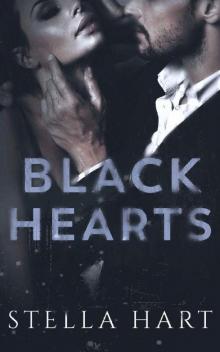 Black Hearts: A Dark Captive Romance (Heartbreaker Book 3)
Black Hearts: A Dark Captive Romance (Heartbreaker Book 3) Wild Elite: A Dark Captive Romance (Dark Dynasty Prequel)
Wild Elite: A Dark Captive Romance (Dark Dynasty Prequel)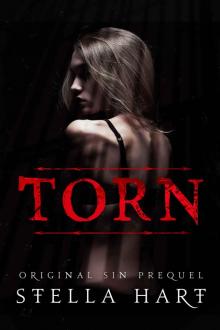 Torn: A Dark Captive Romance (Original Sin Prequel)
Torn: A Dark Captive Romance (Original Sin Prequel)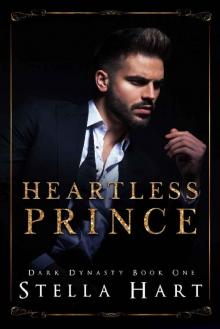 Heartless Prince: A Dark Captive Romance (Dark Dynasty Book 1)
Heartless Prince: A Dark Captive Romance (Dark Dynasty Book 1) Wicked Royals: Ruthless Rulers Prequel
Wicked Royals: Ruthless Rulers Prequel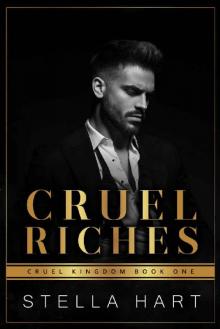 Cruel Riches: A Dark Captive Romance (Cruel Kingdom Book 1)
Cruel Riches: A Dark Captive Romance (Cruel Kingdom Book 1) Cold Hearts
Cold Hearts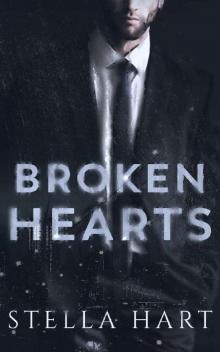 Broken Hearts: A Dark Captive Romance (Heartbreaker Book 2)
Broken Hearts: A Dark Captive Romance (Heartbreaker Book 2) Vicious King: A Dark Captive Romance (Dark Dynasty Book 2)
Vicious King: A Dark Captive Romance (Dark Dynasty Book 2)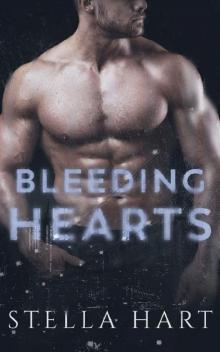 Bleeding Hearts: A Dark Captive Romance (Heartbreaker Book 1)
Bleeding Hearts: A Dark Captive Romance (Heartbreaker Book 1)